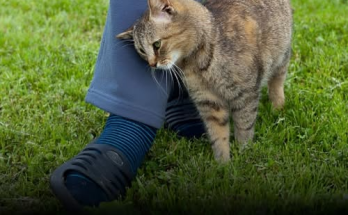I live with my ex-husband, and without asking me, he swapped out our porch light for a green one.
When I questioned him, he simply said, “It’s for my father.” He didn’t explain further, and then walked away. That short answer only left me with more questions. What did a green porch light mean?
My name is Meridith, and yes, I still share a home with my ex-husband, Darion. We divorced two years ago, but because of financial reasons, we decided to keep the house and live in it like awkward roommates. We had separate rooms, separate routines, and barely spoke unless we had to.
One night, after a long, draining day, I pulled into the driveway and froze. The familiar warm white glow of our porch light had been replaced with a vivid green beam, casting an almost eerie hue against the beige siding. It looked strange, even unsettling. I nearly tripped while staring up at it. Inside, I demanded an explanation.
“Why is the porch light green?” I asked sharply.
Darion, calm but weary-eyed, replied, “It’s for my father.” Then he turned away, as if that answer explained everything.
But it didn’t. I knew his father had served in the military and passed away before I ever met Darion, but we had never really talked about him. Now, with this glowing green signal over our house, I felt haunted by what I didn’t know.
Later, I asked my friend Renata at coffee if she’d heard of such a thing. She quickly looked it up and said, “A green porch light can symbolize support for veterans. Maybe that’s what it is.”
It made sense, but I had a feeling there was more to it. That evening, I found Darion sitting on the porch steps, his eyes fixed on the glow. I sat beside him, the humid summer air heavy with honeysuckle and cicadas. We stayed quiet until I asked softly, “Is it about your dad’s service?”
Darion nodded, his voice unsteady. “It’s more than that,” he said. “I just found out… he didn’t die of natural causes. He took his own life. Mom told me last week. The green light—it’s for him. And for every other veteran who’s fighting battles people can’t see. I just… needed something. A reminder.”
His words broke something open inside me. I reached for his hand, surprised when he didn’t pull away. We sat there in silence until mosquitoes drove us indoors.
Over the next weeks, I began to see him differently. He was quieter, more deliberate. He left little reminders on the fridge—“Eat breakfast.” “Don’t skip your walk.” Small acts of care I hadn’t noticed in years. Slowly, I remembered why I’d loved him in the first place.
One evening, I came home to find him cooking dinner. Not frozen pizza, but something simmering and fragrant. I teased him, and he laughed—a real laugh I hadn’t heard in ages. Something shifted between us.
We began eating together again, watching old shows, even sharing conversations we’d avoided for years. Then one night, Darion brought out a box of his father’s letters. We spread them across the table—some crisp, some stained with age. They revealed a man burdened by his past, but full of love he didn’t always know how to show. Listening to Darion read them aloud, I realized he was finally breaking the cycle of silence that had once broken us.
But closeness also brought back old wounds. Arguments resurfaced—about who gave up first, who hurt who worse. One fight ended with me in tears behind a slammed bedroom door. Yet the next morning, I found a note slid under it: “I’m sorry. I still care about you.” Darion stood outside with two cups of coffee, one made just the way I like it.
That was when we decided to try counseling—not to get back together, but to learn to coexist. Session after session, though, we discovered more compassion, more honesty. We wrote letters to each other about what we admired most. His words made me cry. Mine made him smile. Slowly, we stopped keeping score of our failures and started noticing the good.
And then life surprised us again. I found out I was pregnant. When I told him, shock flickered across his face, then softened into tears. “We can do this,” he whispered. “We’ll do it differently this time.”
We moved back into the same bedroom. We painted the nursery a soft green, the same color as the porch light. It became a symbol of hope, healing, and renewal.
Months later, when our daughter was born, I saw that green light glowing outside the hospital window. We named her Leontine, after Darion’s father, to honor the man whose story had changed everything.
We began sharing our journey with neighbors and friends, talking openly about veterans’ struggles and the importance of mental health. That green light sparked conversations and connections we never expected. One neighbor reconciled with her estranged son, another started a local support group. What began as a private gesture became a beacon for others.
Eventually, Darion and I chose to renew our vows in our backyard, under the same green light that once confused me. This time it wasn’t eerie—it was warm, full of promise.
I’ve learned that sometimes love needs a second chance. That forgiveness isn’t forgetting, but choosing to rebuild together. And that even something as simple as a green light can shine a path toward healing, remembrance, and love.
So if you ever see a green porch light, I hope you think about the unseen battles people may be fighting—and maybe let it remind you to check in on the ones you love.

